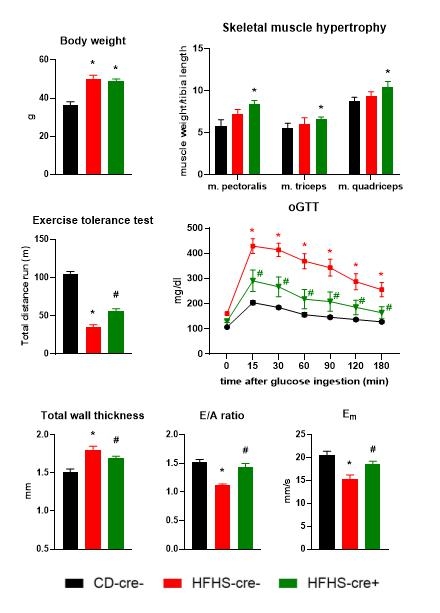Final ID: 4147616
Targeting Skeletal Muscle Growth Improves Diastolic Dysfunction and Left Ventricular Hypertrophy in Obesity-Related Diabetic Cardiomyopathy
Abstract Body (Do not enter title and authors here): Background and Significance: Mice fed a high-fat, high-sucrose (HFHS) “Western” diet develop a cardiac phenotype similar to patients with type 2 diabetes mellitus-related heart failure with preserved ejection fraction (HFpEF). This includes obesity, insulin resistance, left ventricular hypertrophy (LVH), and diastolic dysfunction. Skeletal muscle is responsible for up to 80% of whole-body glucose disposal, making the relationship between muscle mass and insulin resistance crucial for identifying new therapeutic targets in HFpEF. Myostatin is an evolutionally conserved skeletal muscle growth-limiting signaling molecule. Although whole-body deletion of myostatin/activin signaling (MAS) promotes skeletal muscle hypertrophy (SH) and provides metabolic benefits, overall benefits are complicated by direct inhibition in the myocardium.
Hypothesis: Sedentary mice with skeletal muscle-specific deletion of MAS will be protected from the adverse cardiac effects of HFHS diet.
Methods and Results: BL6 mice with floxed alleles for myostatin Acvr2 and Acvr2b receptors were crossbred with mice expressing Cre recombinase from a myosin light chain promoter, rendering the MAS downregulation skeletal muscle specific. Four months of HFHS feeding resulted in similar increase in body weight between Cre+ and Cre- (34% and 37%, respectively). SH was present in Cre+ mice as the muscle weight/tibia length ratio of m. pectoralis, triceps and quadriceps was elevated by 44, 22 and 25%, respectively. Oral glucose tolerance was improved in Cre+ vs Cre-. Echocardiography showed improved LV hypertrophy and diastolic function (increased E/A ratio and Em by 27 and 21%) in the Cre+ group. Moreover, exercise capacity was improved in Cre+ mice by 59%.
Conclusion: Our novel study demonstrates that targeting skeletal muscle growth through the inhibition of MAS, without direct cardiac effects, can ameliorate the cardiac dysfunction associated with obesity-related diabetic cardiomyopathy. Increased muscle mass improves glucose tolerance, LVH, and diastolic function, demonstrating skeletal muscle-to-myocardium cross-talk. This highlights the potential for muscle-targeted therapies in managing HFpEF, particularly in insulin-resistant conditions.
Hypothesis: Sedentary mice with skeletal muscle-specific deletion of MAS will be protected from the adverse cardiac effects of HFHS diet.
Methods and Results: BL6 mice with floxed alleles for myostatin Acvr2 and Acvr2b receptors were crossbred with mice expressing Cre recombinase from a myosin light chain promoter, rendering the MAS downregulation skeletal muscle specific. Four months of HFHS feeding resulted in similar increase in body weight between Cre+ and Cre- (34% and 37%, respectively). SH was present in Cre+ mice as the muscle weight/tibia length ratio of m. pectoralis, triceps and quadriceps was elevated by 44, 22 and 25%, respectively. Oral glucose tolerance was improved in Cre+ vs Cre-. Echocardiography showed improved LV hypertrophy and diastolic function (increased E/A ratio and Em by 27 and 21%) in the Cre+ group. Moreover, exercise capacity was improved in Cre+ mice by 59%.
Conclusion: Our novel study demonstrates that targeting skeletal muscle growth through the inhibition of MAS, without direct cardiac effects, can ameliorate the cardiac dysfunction associated with obesity-related diabetic cardiomyopathy. Increased muscle mass improves glucose tolerance, LVH, and diastolic function, demonstrating skeletal muscle-to-myocardium cross-talk. This highlights the potential for muscle-targeted therapies in managing HFpEF, particularly in insulin-resistant conditions.
More abstracts on this topic:
Associations Between Multiple Ectopic Adiposity Depots and Gait Speed in African Caribbean Men
Cvejkus Ryan, Zmuda Joseph, Carr John, Terry James, Nair Sangeeta, Glynn Nancy, Wheeler Victor, Miljkovic Iva
A mechanism whereby SGLT2 inhibitor dapagliflozin reverses cardiac diastolic dysfunction in a model of HFpEFLiu Man, Liu Hong, Kang Gyeoung-jin, Kim Eunji, Neumann Mitchell, Johnson Madeline, Murikinati Ruthvika, Dudley Samuel

